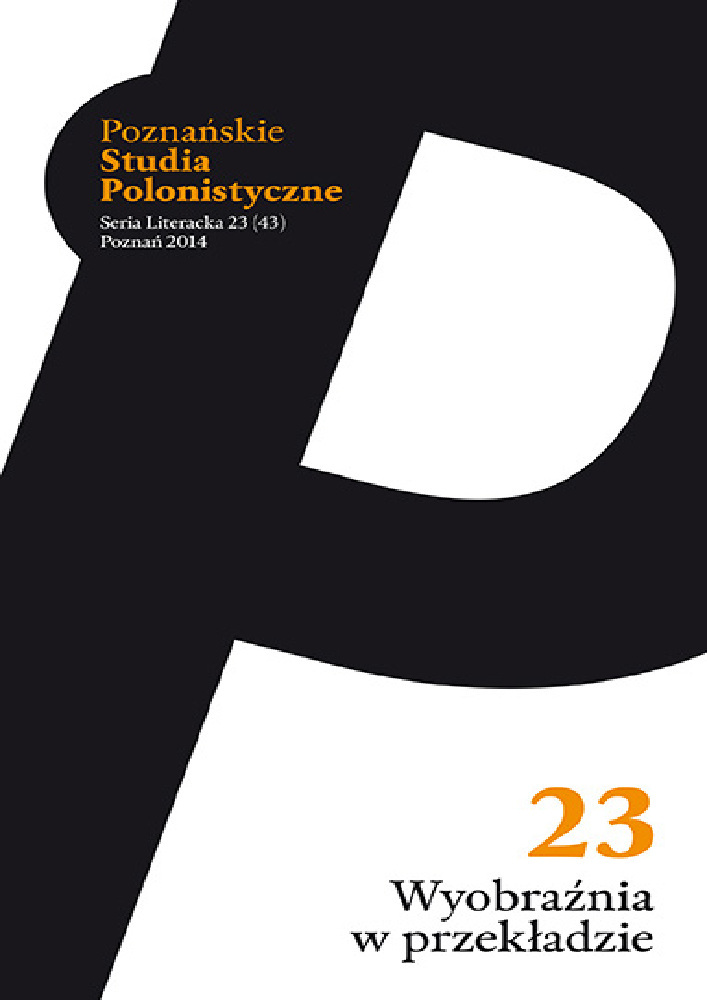Abstract
The theme of the article is translation as a mode of internal immigration. Paul Celan, who chose German as the language of his work, (it was the language of his mother and of murderers), found a sanctuary also as translator. In translator’s profession, he found ways of distilling the German language, which never ceased to be his “internal landscape” in spite of the wound inflicted to the language by Nazism. Most of the discussion focuses on Celan’s motivations when he translated Osip Mandelstam’s poetry.Funding
Narodowe Centrum Nauki
References
Berendsohn W.A., Nelly Sachs. Einführung in das Werk der Dichterin jüdischen Schicksals, Frankfurt am Main 1974.
Bonola A., Osip Mandelstams „Egipetskaja marka”. Eine Rekonstruktion der Motivenmosaik, Munich 1995.
Broda M., „An Niemand gerichtet”. Paul Celan als Leser von Mandelstamms „Gegenüber”, w: Paul Celan, red. W. Hamacher, W. Menninghaus, Frankfurt am Main 1988.
Cavanagh C., Osip Mandelstam and the Modernist Creation of Tradition, Princeton 1995.
Celan Handbuch, red. M. May, P. Goßens, J. Lehmann, Stuttgart – Weimar 2008.
Celan P., Die Gedichte. Kommentierte Gesamtausgabe in einem Band, red. B. Wiedemann, Frankfurt am Main 2005.
Celan P., Demus K. i N., Briefwechsel. Mit einer Auswahl aus dem Briefwechsel zwischen Gisèle Celan-Lestrange und Klaus und Nani Demus, zebrał i przypisami opatrzył J. Seng, Frankfurt am Main 2009.
Celan P., Sachs N., Briefwechsel, red. B. Wiedemann, Frankfurt am Main 1996.
Drei russische Dichter: Alexander Block, Ossip Mandelstamm, Sergej Jessenin. Gedichte übertragen von Paul Celan, Frankfurt am Main 1963.
Felman S., Nauczanie i kryzys albo meandry edukacji, tłum. M. Lachman, „Literatura na Świecie” 2004, nr 1–2.
Felstiner J., Paul Celan. Poeta, ocalony, Żyd, tłum. M. i M. Tomalowie, Kraków – Budapeszt 2010.
Fiero P.S., Schreiben gegen Schweigen: Grenzerfahrungen in Jean Amérys utobiographischen Werk, Hildesheim – Zürich – New York 1997.
„Fremde Nähe”. Celan als Übersetzer: eine Ausstellung des Deutschen Literaturarchivs in Verbindung mit dem Präsidialdepartement der Stadt Zürich im Schiller-Nationalmuseum Marbach am Neckar und im Stadthaus Zürich, Marbach am Neckar 1997.
Freidin G., A coat of many colors: Osip Mandelstam and his mythologies of self-presentation, London 1987.
Glazova A., Celan’s Mandelstam, http://spintongues.vladivostok.com/glazova35eng.htm, dostęp: 17 maja 2013.
Gossens P., Paul Celan Ungaretti-Übersetzungen, red., przyp. C. Winter, Heidelberg 2000.
Harbusch U., Gegenübersetzungen. Paul Celans Übertragungen französischer Symbolisten, Göttingen 2005.
Ivanović Ch., Das Gedicht im Geheimnis der Begegnung. Dichtung und Poetik Celans im Kontext seiner russischen Lektüren, M. Niemeyer, Tübingen 1996.
Krynicki R., Poezja żywa, w: idem, Magnetyczny punkt. Wybrane wiersze i przekłady, Warszawa 1996.
Mandelstamm O., Gedichte. Aus dem Russischen übertragen von Paul Celan, Frankfurt am Main 2004.
Mandelstamm O., Gedichte. Deutsch von Paul Celan, Frankfurt am Main 1959.
Mandelsztam O., Nieograbiony i nierozgromiony. Wiersze i szkice, tłum., wybór, komentarze A. Pomorski, Warszawa 2011.
Mandelsztam O., Nikomu ani słowa…, wybór, posłowie T. Klimowicz, tłum. zespół, Kraków 1998.
Mandelstamm O., Vom Gegenüber, tłum. D. Rodenwald, w: Paul Celan, red. W. Hamacher, W. Menninghaus, Frankfurt am Main 1988.
Mandelsztam O., ***Ta noc pełna łez i żalu, w: idem, Trzydzieści trzy wiersze. Przekłady i komentarze Jarosława Marka Rymkiewicza, Kraków 2003.
May M., „Ein Klaffen, das mich sichtbar macht”. Untersuchungen zu Paul Celans Übersetzungen amerikanischer Lyrik, Heidelberg 2004.
Oz A., Opowieść o miłości i mroku, tłum. L. Kwiatkowski, Warszawa 2006.
Pausch H., Paul Celan, Berlin 1981.
Pennone F., Paul Celans Übersetzungspoetik. Entwicklungslinien in seinen Übertragungen französischer Lyrik, Tübingen 2007.
Romaniuk R., Radziecka ruletka. O Nadieżdzie Mandelsztam, w: idem, One. Nadieżda Mandelsztam, Anna Iwaszkiewiczowa, Zofia Tołstojowa, Maria Kasprowiczowa, Warszawa 2005.
Steiner G., Po wieży Babel. Problemy języka i przekładu, tłum. O. i W. Kubińscy, Kraków 2000.
Szaruga L., Syberyjsko, w: Kartki Celana. Interpretacje, red. J. Roszak, Kraków – Budapeszt 2012.
Szondi P., Poetry of Constancy – Poetik der Beständigkeit. Celans Übersetzung von Shakespeares Sonett 105, w: Celan-Studien, Frankfurt am Main 1972.
Werberger A., Paul Celan and Osip Mandelstam, „Arcadia” 1997, nr 32.
Werner U., Paul Celans geologische Lyrik, Munich 1998.
License
Authors
Authors of texts accepted for publication in „Poznańskie Studia Polonistyczne. Seria Literacka” are required to complete, sign and return to the editor's office the Agreement for granting a royalty-free license to works with a commitment to grant a CC sub-license.
Under the agreement, the authors of texts published in „Poznańskie Studia Polonistyczne. Seria Literacka” grant the Adam Mickiewicz University in Poznań a non-exclusive, royalty-free license and authorize the use of Attribution-NoDerivatives 4.0 International (CC BY-ND 4.0)Creative Commons sub-license.
The authors retain the right to continue the free disposal of the work.
Users
Interested Internet users are entitled to use works published in „Poznańskie Studia Polonistyczne. Seria Literacka” since 2016, for non-commercial purposes only, under the following conditions:
- attribution - obligation to provide, together with the distributed work, information about the authorship, title, source (link to the original work, DOI) and the license itself.
- no derivatives - the work must be preserved in its original form, without the author's consent it is not possible to distribute the modified work, such as translations, publications, etc.
Copyrights are reserved for all texts published before 2016.
Miscellaneous
Adam Mickiewicz University in Poznań retains the right to magazines as a whole (layout, graphic form, title, cover design, logo etc.).
